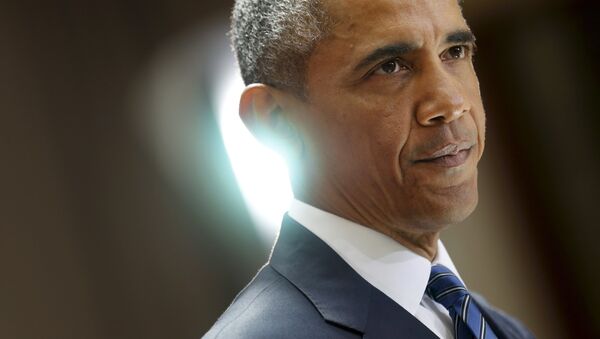In his article, republished and translated by foreign media translation service WhatTheySayAboutUSA.com, Faissner recalled that in the run-up to his presidency, while he was still a candidate, Barack Obama "was presented as the savior of the world – almost a Messiah."
"He was rapturously greeted by a crowd of over 200,000 in Berlin in 2008 – even before he had been officially crowned as President of the USA. “Yes, We Can!” was the campaign slogan that electrified the crowd, even before he began speaking. The American presidential candidate gathered bigger crowds in Germany than even the Pope, rock stars, or a football game with the national team. He promised to liquidate nuclear arms, reestablish good relations with Russia, pull American troops out of Iraq and Afghanistan – and to close the US's nefarious concentration camp at Guantanamo Bay."
"As the US's first black president," Faissner reflected, "Barack Obama ought to have become the antithesis of everything that George 'Dubya' Bush had stood for – a president whose wars had run through the world like cancer, whilst clamping down on basic freedoms for his own people. This was the way the media presented the incoming President Obama – and the world believed the simulacrum they'd been given."
"Like his predecessor, Obama threw all his weight behind GMO agriculture; he didn't give the slightest thought to his promises to close Gitmo; he showed no interest whatsoever in improving relations with Russia, and he worked actively on destabilizing the situation in the Middle East."
A 'Tense' Relationship With Journalists
"In 2009," Faissner recalled, "the incoming president declared his intentions for a previously unprecedented level of transparency in government and the apparatus of national administration. 'Openness will strengthen our democracy,' as he stressed in subsequent legislation."
However, "now that Obama has been at the helm for nearly seven years, it's clear that all these promises were empty piffle. No president after Richard Nixon has been so aggressively opposed to the media, as was highlighted in a piece written by the former Washington Post chief editor Leonard Downie, published in 2013 – about freedom of speech in the United States. Downie suggested the Obama administration was operating a misinformation policy, used electronic snooping on journalists, and was behind a ratcheted-up campaign of persecution against whistleblowers and journalists involved in investigation."
"On top of this," Faissner laments, "Obama administration staffers frequently take personal offense to articles criticizing government policy. To ward off the increasing frequency of such articles, the Obama administration is increasingly reaching out for the 1917 Espionage Act. Although it had only been employed three times in the first 90 years of its existence, over the period between 2009 to 2013…eight different government officials were arraigned with it, charged with passing governmental information to journalists, putting out a powerful resonance on Capitol Hill. One of those thus charged was Edward Snowden, who blew the whistle on government snooping on the whole world's population by the National Security Agency. Bob Woodward, who broke the news of the Watergate scandal in the Nixon era, warns that any fight against critical journalists only leads in the long term to weaken the nation's national security."
A Unique and Powerful Surveillance System
"In reality," Faissner warned, "Obama has set up a unique system of surveillance. It was done in such a way that people around the world have no idea that Obama's policies are a continuation, or even a worsening of those of George W Bush. Since October 2011 government staffers in every branch of the administration have been encouraged to snitch on their colleagues. Staff in Federal departments have been obliged since 2012 to report all their contacts with the media, and moreover to report on suspicious colleagues. Michael Hayden, the former head of the CIA, said the program had been incepted to 'block all contact.' Even staffers of new agencies who are remote from revolutionary activities, such as Associated Press or Fox News have come under the crosshairs of the Obama administration."
Moreover, Faissner suggests, "the situation worsened drastically in 2015. In a document entitled 'Law on War' [a set of instructions on the legitimate warfare practices approved by the US military], the Pentagon stated that journalists could be treated as 'unprivileged belligerents,' a status which, according to a representative from the Committee for the Protection of Journalists, 'gives U.S. military commanders across all services the purported right to at least detain journalists without charge, and without any apparent need to show evidence or bring a suspect to trial.'"
"If the Pentagon is putting spying in the same basket as journalism, the New York Times noted, then this is a step in the same direction as totalitarian regimes. It's hardly surprising that in the World Press Freedom Index for 2015, the USA is rated at 49 place – on a par with El Salvador, Burkina Faso and the Republic of Niger."







